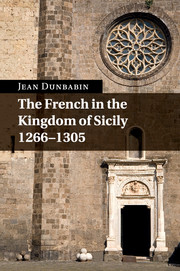Book contents
- Frontmatter
- Contents
- Acknowledgements
- List of abbreviations
- Genealogical tables
- Introduction
- Part I Means of communication
- Part II Indirect channels of communication
- Part III Settlers in the Regno
- Part IV Cultural and political impacts
- 10 Royal ideology: the saintly family
- 11 Religious politics and practices
- 12 The universities of Naples and Paris
- 13 Medicine and science
- 14 Law
- 15 Administrative practices
- 16 Navy and army
- 17 Literature
- Epilogue: spurs to remembering
- Conclusion
- Bibliography
- Index
14 - Law
Published online by Cambridge University Press: 03 May 2011
- Frontmatter
- Contents
- Acknowledgements
- List of abbreviations
- Genealogical tables
- Introduction
- Part I Means of communication
- Part II Indirect channels of communication
- Part III Settlers in the Regno
- Part IV Cultural and political impacts
- 10 Royal ideology: the saintly family
- 11 Religious politics and practices
- 12 The universities of Naples and Paris
- 13 Medicine and science
- 14 Law
- 15 Administrative practices
- 16 Navy and army
- 17 Literature
- Epilogue: spurs to remembering
- Conclusion
- Bibliography
- Index
Summary
As with medicine, so with law: much of the most interesting work was conducted, both in Naples and in Paris, at the royal court or in the most important courts of each country rather than within the law faculties of the universities. Lawyers in royal service have left fuller records of what they did than have physicians. But they were less likely than were physicians to leave identifiable traces of what they borrowed from where. Therefore this section is a rather loose one. Its argument is that French royal law became increasingly similar to that of the Regno in the period 1266 to c.1305, and that the facts are compatible on occasion with direct borrowing. In cases where this cannot be stated with confidence, because alternative hypotheses are also plausible, it is still worth considering possible influences from the Regno because they may yield some fresh insights on the French legal scene.
The Regno became, under Frederick II, the beacon for the legal development of western Europe in the later thirteenth century. Within a relatively compact area, the emperor was able to create his own version of law to a degree unthinkable anywhere else before 1250. Conscious as he was of the historical role of Roman emperors in legislating, it was as king of the Regno that he fulfilled this role in a thorough-going way.
- Type
- Chapter
- Information
- The French in the Kingdom of Sicily, 1266–1305 , pp. 235 - 249Publisher: Cambridge University PressPrint publication year: 2011



